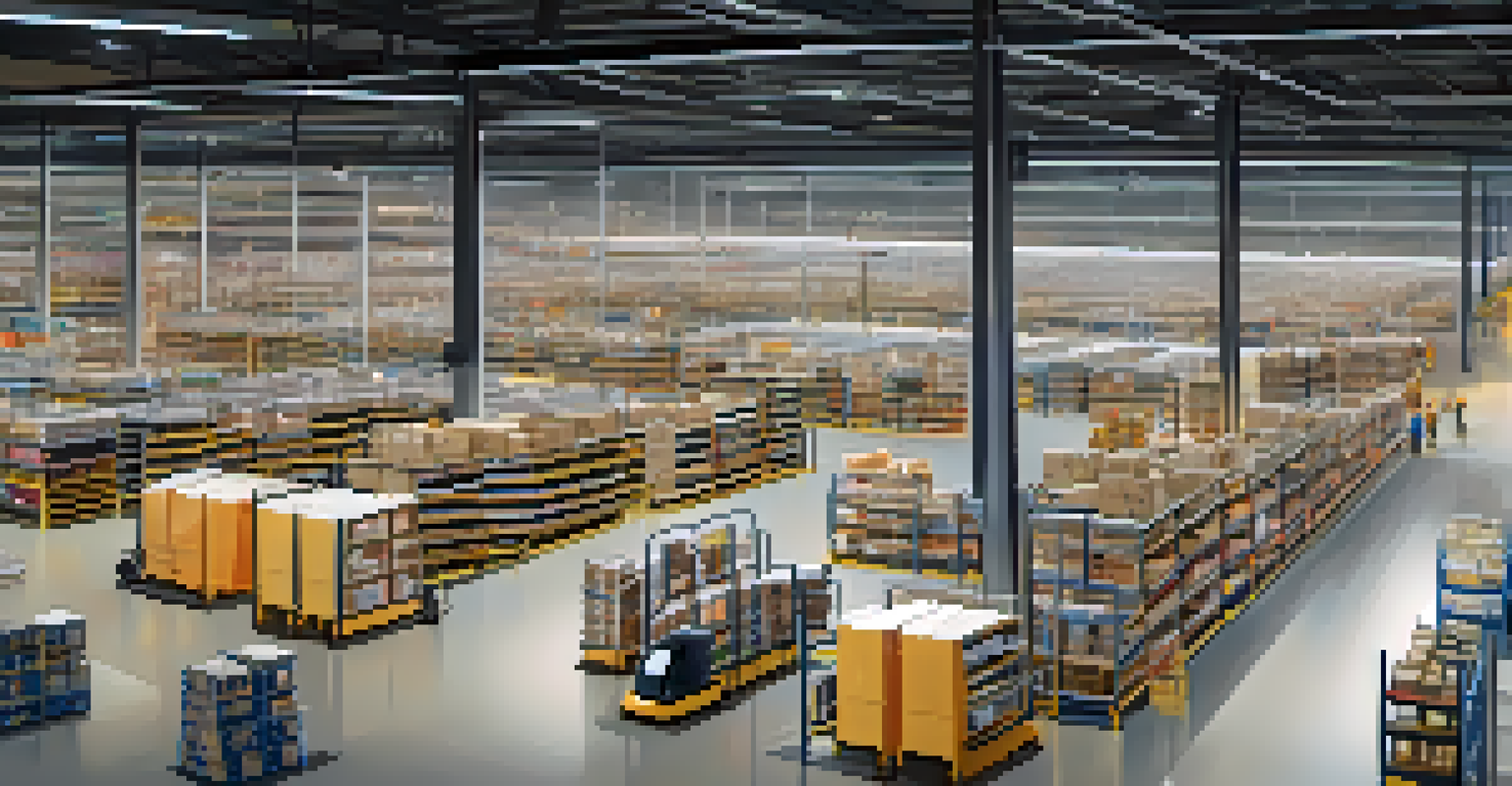Transportation and Logistics: Key Economic Drivers in Illinois

The Importance of Transportation in Illinois' Economy
Transportation is a backbone of Illinois' economy, facilitating trade and movement. With its strategic location at the crossroads of major highways and railroads, Illinois serves as a critical hub for goods flowing across the Midwest and beyond. This interconnectedness not only boosts local businesses but also attracts national and international companies looking to optimize their supply chains.
Transportation is the backbone of a nation's economy.
The Chicago metropolitan area, in particular, stands out with O'Hare International Airport and one of the country's busiest freight rail networks. This infrastructure supports various industries, including manufacturing, agriculture, and retail, ensuring that products reach consumers quickly and efficiently. As a state, Illinois thrives on the efficiency of these logistics systems, which are vital for maintaining competitive market positions.
Moreover, the transportation sector provides thousands of jobs, contributing significantly to the state's employment rates. From truck drivers to logistics managers, the variety of roles available highlights the sector's significance. As businesses continue to grow and evolve, Illinois' transportation infrastructure will remain pivotal in driving economic prosperity.
Logistics: The Heart of Supply Chain Management
Logistics encompasses the planning, execution, and management of the flow of goods, making it essential for economic growth. In Illinois, logistics is not just a function but a vital industry that ensures products move smoothly from manufacturers to consumers. This involves everything from managing warehouses to coordinating transportation, all designed to minimize costs and maximize efficiency.

The state's investment in logistics technology also plays a key role. Innovations like automated warehouses and real-time tracking systems are transforming how goods are stored and transported. These advancements help businesses respond quickly to market demands, leading to increased customer satisfaction and loyalty.
Transportation Fuels Illinois' Economy
The strategic location and extensive transportation infrastructure in Illinois significantly boost trade, support local businesses, and attract national and international companies.
Additionally, the logistics industry in Illinois fosters collaboration among various stakeholders, including manufacturers, retailers, and transportation providers. This synergy creates a more resilient supply chain, allowing for better adaptability in times of disruption, such as during natural disasters or global crises.
Key Transportation Infrastructure in Illinois
Illinois boasts extensive transportation infrastructure that significantly contributes to its economy. Major highways like Interstate 55 and Interstate 90 facilitate the movement of goods across the state and beyond. These road networks are vital for trucking companies that rely on efficient routes to deliver products promptly.
Logistics is the bridge between supply and demand.
In addition to highways, the state's railroads are among the busiest in the nation, with Chicago serving as a critical junction. Freight trains transport large volumes of goods, making rail transport a cost-effective alternative for long-distance shipping. This infrastructure reduces congestion on roads and lowers transportation costs for businesses.
Furthermore, the presence of ports along Lake Michigan adds another dimension to Illinois' transportation capabilities. The Port of Chicago, for instance, supports both domestic and international shipping, connecting land and water routes. This diverse transportation network ensures that Illinois remains a key player in the logistics industry.
The Role of Technology in Transportation and Logistics
Technology is revolutionizing the transportation and logistics sectors in Illinois, driving efficiency and innovation. The integration of advanced software for route optimization and inventory management allows companies to streamline their operations. This technological advancement not only saves time but also reduces operational costs, which is crucial for businesses aiming for profitability.
Moreover, the rise of e-commerce has intensified the need for effective logistics solutions. Companies are investing in automated warehouses and drone delivery systems to meet consumer demands for faster shipping. Illinois businesses are at the forefront of these innovations, leveraging technology to enhance their service offerings.
Logistics Drives Industry Efficiency
Innovations in logistics technology enhance the efficiency of supply chains, enabling businesses in Illinois to respond quickly to market demands and improve customer satisfaction.
Additionally, data analytics plays a significant role in decision-making processes within the industry. By analyzing transportation patterns and consumer behavior, companies can make informed choices that lead to improved efficiency and customer satisfaction. This data-driven approach is essential for staying competitive in a fast-paced market.
Challenges Facing the Transportation and Logistics Sector
Despite its strengths, the transportation and logistics sector in Illinois faces several challenges. One major issue is the aging infrastructure, which can lead to delays and increased maintenance costs. As traffic volumes continue to rise, the need for upgrades and repairs becomes increasingly critical to ensure smooth operations.
Another challenge is the shortage of skilled labor. As the industry grows, companies are struggling to find qualified workers for various roles, from truck drivers to logistics analysts. This shortage can hinder growth and efficiency, prompting businesses to invest in training programs to cultivate talent from within.
Additionally, fluctuating fuel prices and regulatory changes can impact transportation costs. Companies must remain agile and adapt to these changes to maintain profitability. Addressing these challenges is essential for sustaining the growth and competitiveness of Illinois' transportation and logistics sector.
Economic Impact of Transportation and Logistics in Illinois
Transportation and logistics significantly contribute to the overall economy of Illinois. These sectors create jobs, generate tax revenue, and spur business growth across various industries. According to estimates, the logistics sector alone accounts for a substantial portion of the state's GDP, underscoring its importance.
Furthermore, the efficiency of transportation systems attracts businesses to set up operations in Illinois. Companies benefit from reduced shipping times and costs, making the state an attractive location for logistics-intensive industries. As more businesses choose to establish themselves in Illinois, the economic impact continues to grow.
Challenges Threaten Sector Growth
Aging infrastructure, labor shortages, and fluctuating fuel prices pose significant challenges to the continued growth and competitiveness of Illinois' transportation and logistics sectors.
Moreover, the ripple effects of a robust transportation sector extend beyond immediate economic benefits. Improved logistics systems lead to better access to goods and services for consumers, enhancing overall quality of life. This interconnectedness between transportation, logistics, and economic development is vital for the state's long-term prosperity.
Future Trends in Transportation and Logistics in Illinois
Looking ahead, several trends are set to shape the future of transportation and logistics in Illinois. One notable trend is the increasing emphasis on sustainability. As environmental concerns rise, businesses are exploring greener transportation options, such as electric vehicles and alternative fuels. This shift not only helps the environment but also meets consumer demand for more sustainable practices.
Additionally, the growth of e-commerce will continue to influence logistics strategies. Companies are adapting their supply chains to accommodate rapid delivery expectations, often resulting in the establishment of regional distribution centers. Illinois is well-positioned to leverage this trend due to its central location and existing infrastructure.

Lastly, advancements in automation and artificial intelligence are expected to revolutionize the industry further. From autonomous trucks to smart warehouses, these technologies promise to enhance efficiency and reduce costs. As Illinois embraces these innovations, it will solidify its status as a leader in the transportation and logistics sectors.